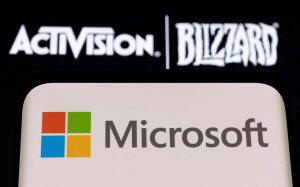|
Microsoft closed the deal, originally proposed in January 2022
as the biggest acquisition in the history of the gaming
industry, on Oct. 13 of this year after obtaining the approval
of British regulators.
The Federal Trade Commission, however, is expected to tell a
three-judge appeals court panel in California that the
lower-court judge held the agency to too high a standard,
effectively requiring it to prove that the deal was
anticompetitive when the standard is simply that the deal raises
serious competitive concerns.
The FTC is fighting an uphill battle, given that it lost the
lower-court fight and that the EU and Britain have signed off on
the deal.
The legal battle is part of a broader push by the Biden
administration to fight mergers and price hikes that affect
consumers in areas ranging from medicines to airline tickets.
The FTC is also expected to argue the judge was wrong to rely on
deals that Microsoft struck with rivals to distribute games as
proof the merger would not hurt competition.
The FTC filed a lawsuit aimed at stopping the deal in December
2022, arguing that Microsoft would use Activision's popular
games to suppress competition to its Xbox consoles and dominate
fast-growing subscription and cloud gaming businesses. But a
federal judge in California ruled in July that it failed to make
its case.
Microsoft is expected to argue that the FTC has failed to show
that the judge erred in her ruling. It will also contend that
the agency failed to show that Microsoft had an incentive to
withhold "Call of Duty" from rival gaming platforms.
The judges on the panel are scheduled to be Daniel Collins and
Danielle Forrest, both nominated by former President Donald
Trump, and Jennifer Sung, nominated by President Joe Biden.
(Reporting by Diane Bartz in Washington; Editing by Matthew
Lewis)
[© 2023 Thomson Reuters. All rights
reserved.]
This material may not be published,
broadcast, rewritten or redistributed.
Thompson Reuters is solely responsible for this content.

|
|




